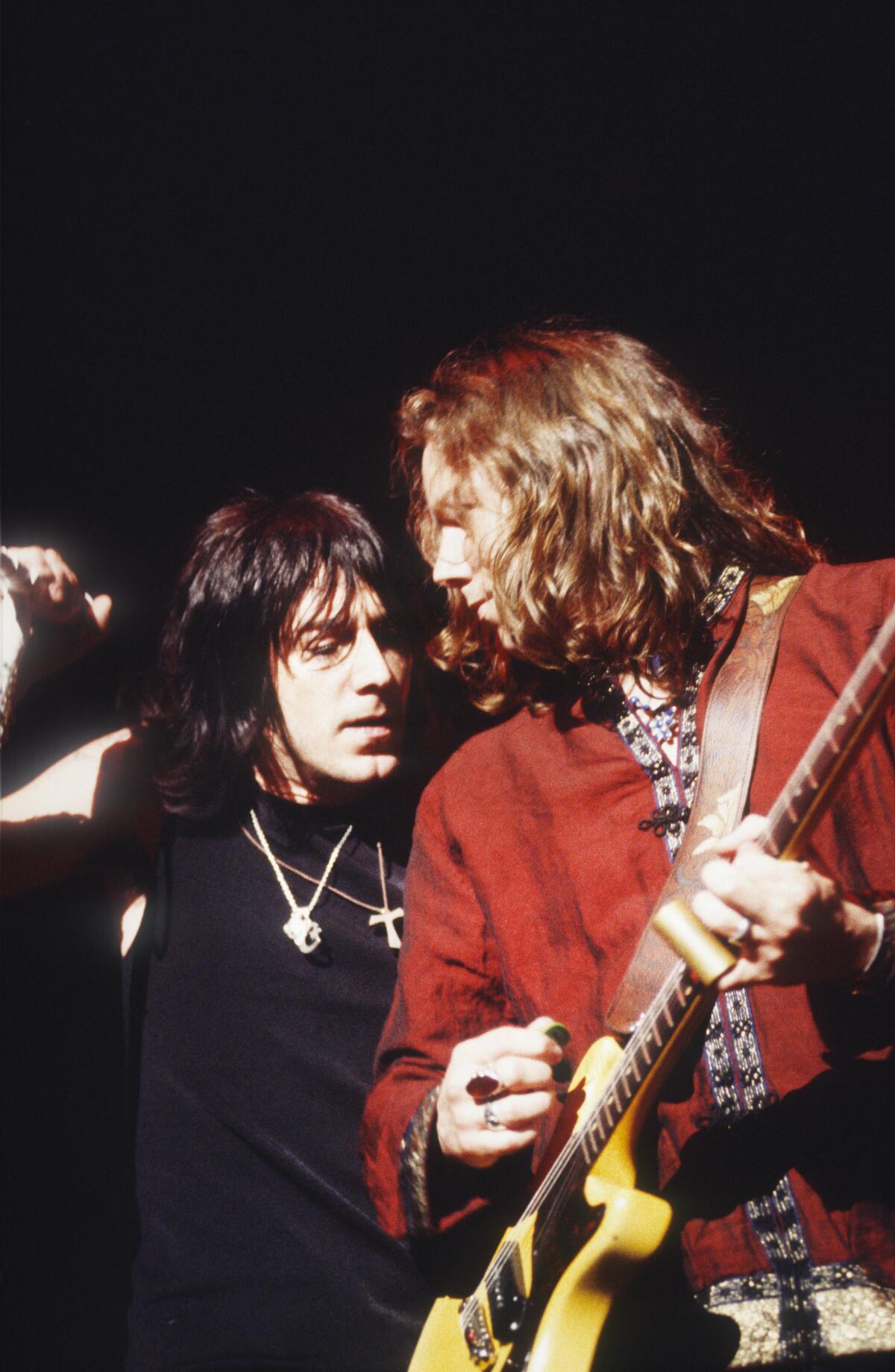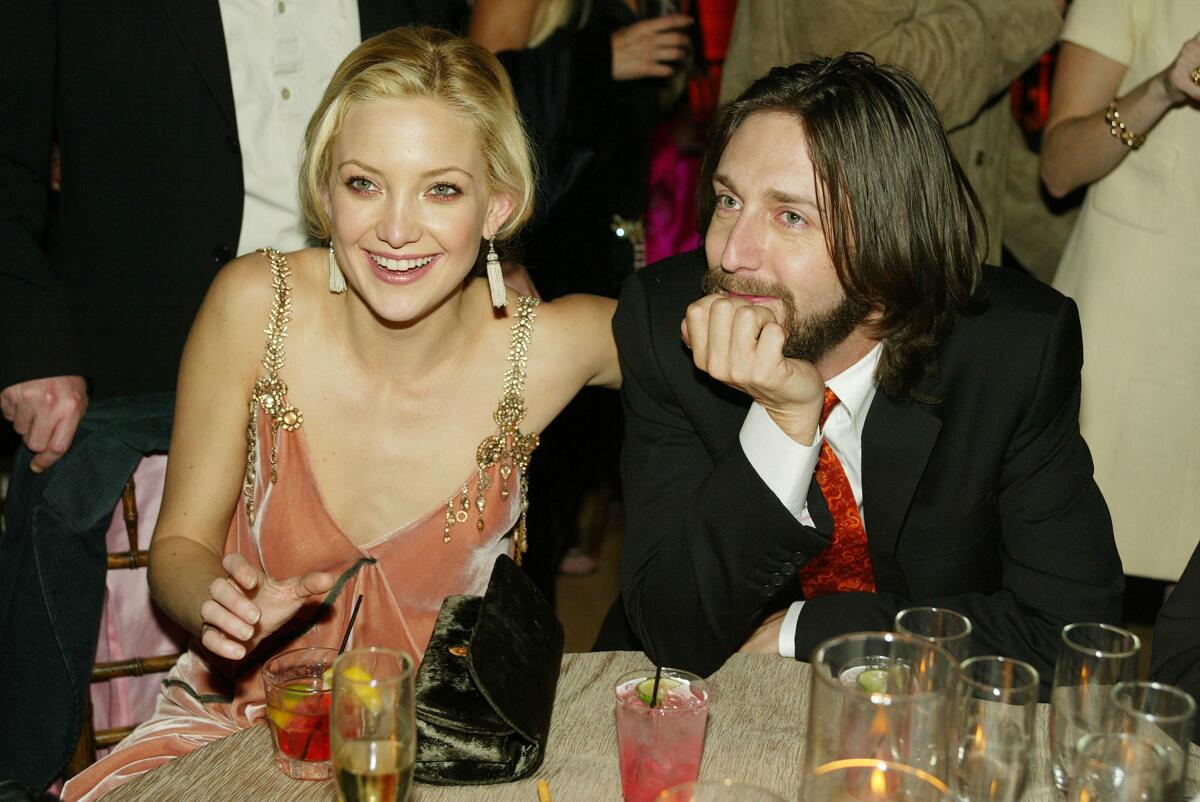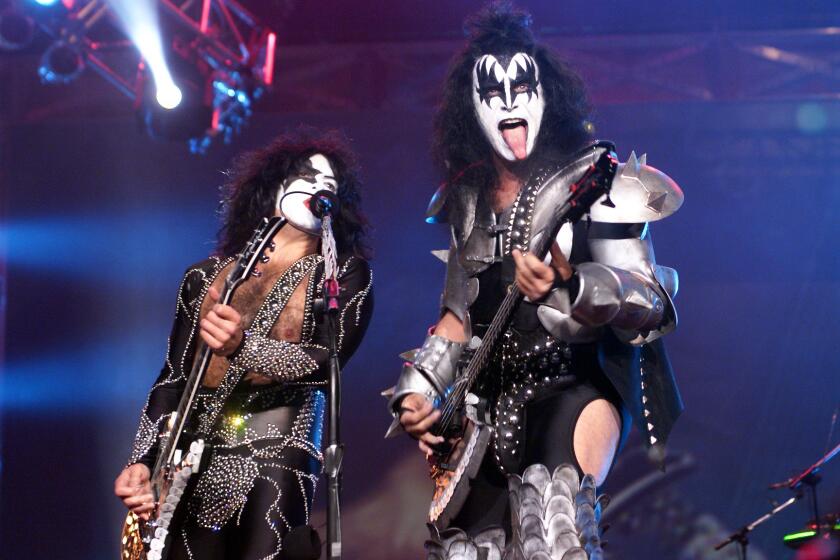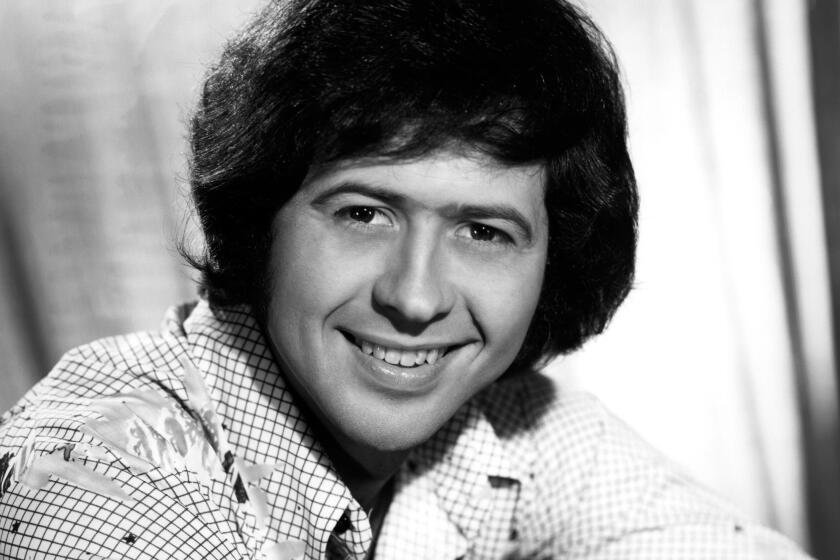Chris and Rich Robinson swore never to speak again. But for the Black Crowes, rock heals all wounds
- Share via
Chris Robinson of the Black Crowes saunters wearily into the bar at the Sunset Marquis — a familiar rock-star crash pad from his days on the road leading one of the great live bands of the 1990s — wearing striped pajama pants and a slightly bedraggled facial expression.
It’s a sweltering evening in early July, and the singer and his wife of two years, Camille Johnson, have just reached Los Angeles after a long drive from Telluride, Colo., where they lived until packing up and splitting a couple days before. Robinson doesn’t ski, but that didn’t keep him from enjoying the mountain town’s natural beauty and its “super-boheme vibe” in the years after the Crowes broke up nearly a decade ago.
“We’d do French cooking, listen to Sidney Bechet, read Russian literature,” he says of his and Johnson’s domestic routine; the other night, they caught a bit of Oliver Stone’s “The Doors” on TV, as Robinson is reminded when he spies Julian Brodsky’s iconic portrait of Jim Morrison on a wall at the hotel. “Worst movie of all time,” he says.
Now the couple have relocated to L.A. — “We’re literally meeting the moving truck tomorrow” — to be closer to the teenage son Robinson shares with his second wife, actor Kate Hudson. Lowering his lanky frame onto a sofa, the frontman exhales deeply and orders a double mezcal margarita.
For Robinson, 54, and with a bushy salt-and-pepper beard, the move is a new beginning that happens to coincide with a look back: A few days after our meeting, he’ll fly to Nashville to launch a tour with the Black Crowes meant to celebrate the 30th anniversary of the group’s hit 1990 debut, “Shake Your Money Maker.” (The tour, due to stop Thursday night at the Forum in Inglewood, was supposed to happen in 2020 but was postponed a year because of the COVID-19 pandemic.)

The reunion, which has also spun off a deluxe reissue of “Money Maker,” marks Robinson’s reconciliation with his younger brother, guitarist Rich Robinson, with whom Chris formed the band near Atlanta in the mid-1980s — and with whom he fought explosively over money and creative control even as the Crowes went on to sell millions of records and blanket MTV with soulful, hard-hitting Southern rock songs like “Jealous Again,” “Remedy” and their frisky cover of Otis Redding’s “Hard to Handle.”
“We were horrible to each other — me probably more than him,” Chris says today of his only sibling. In 2013, after several previous breaks and with the group’s popularity at an all-time low, the Robinsons finally called it quits, issuing a statement in which they “vowed never to play or speak together again.” Yet an unplanned run-in years later in New York, during which Chris realized he had young nephews and nieces he’d never met, led the brothers to reconnect.
“We’ve learned a lot and loved a lot and lost a lot,” says Chris, not too tired from his drive to dole out a little jive philosophy. The singer’s eight years of therapy helped, he adds, as did the brothers’ separate work with jammy side projects including the Chris Robinson Brotherhood and Rich’s Magpie Salute.

The idea to showcase “Shake Your Money Maker” — in concert, the band is playing the LP from front to back — felt like a fresh approach for the once-freewheeling Black Crowes, says Rich, 52, in a phone call from his home in Nashville. “From Day 1, we’ve always run away from whatever record we just finished,” he says, gruffer and more matter-of-fact than his brother. “So for the first time, we’re like, ‘Hey, let’s have some discipline and focus and see what that does for us every night.’”
So far, so good, says the group’s bassist, Sven Pipien, when he checks in this month from the road. “This reset has done wonders,” says Pipien, who’s played on and off with the Crowes since the late ’90s. “There’s always a point three weeks into a tour when everybody’s tired and cranky. But even through this normally harrowing phase, I’m so impressed with everyone’s professionalism.”
With a laugh, the bassist adds: “I say ‘professionalism,’ and that’s definitely one side of it. But it’s also just really fun.”

Eventually certified quintuple-platinum, “Money Maker,” which also features the Top 40 acoustic ballad “She Talks to Angels,” appeared at a transitional moment in rock ’n’ roll, as the music’s epicenter shifted from the glittering Sunset Strip to moody, overcast Seattle. “If the tsunami of grunge had just been a big wave, we would have been responsible for ruining hair metal,” Chris says, grinning as he asks for another margarita. “Now all those guys go on TV and say Nirvana ended their careers.”
Yet the album also caught an in-between quality baked into the Black Crowes, whose members came up through a largely white rock scene in an indelibly Black cultural capital. Chris, whose father was a musician, says the first acts he saw in concert were Slave, Kool & the Gang and the S.O.S. Band — “I was with four or five of my friends, and across the whole amphitheater we could see another group of four or five white kids” — and there’s no denying the R&B influence that shaped the group’s music as readily as the Rolling Stones and the Allman Brothers Band.
“In Atlanta, they’d say, ‘Don’t perpetrate something you ain’t,’” Chris says, explaining his reluctance to describe himself as a soul singer. But soul is undoubtedly what drives his raspy, pleading vocal in tunes like “Twice as Hard,” the LP’s strutting opener, and the churchy “Seeing Things.”
“That’s what was different about it from what was out before,” says George Drakoulias, who produced “Money Maker” and shepherded the Crowes to Rick Rubin’s Def American label. “You had a guy who could sing the phone book. And there was just nothing else in the space that worked its way from the feel up.”
BTS, KISS and Stevie Nicks are among the musical acts that have nixed or postponed tour dates as the very contagious Delta variant spreads.
The group leaned further into its love of gospel and R&B on its 1992 follow-up, “The Southern Harmony and Musical Companion,” which bumped Kris Kross’ “Totally Krossed Out” from atop the Billboard 200 and which Rich today calls the Black Crowes album he’s proudest of. Playing theaters behind “Companion,” the band was somehow both tender and ferocious, with Rich leading a blistering multiguitar attack while Chris leaped around the stage oozing snake-hipped charisma.
By the early 2000s, though, the Crowes’ songwriting had gotten pretty wobbly; what’s more, the Robinsons’ constant squabbling had demoralized the rest of the band. In 2019, the group’s original drummer, Steve Gorman, published a juicy memoir in which he accused the brothers of creating a violent environment — as in one dressing-room battle in San Antonio involving beer cans and shattered glass — and of squandering opportunities, including a potential studio collaboration with Led Zeppelin’s Jimmy Page, with whom the Crowes had recorded a live album at L.A.’s Greek Theatre in 1999.

Asked whether Gorman’s book pained him, Rich replies, “It didn’t really affect me or make me sad. No one really takes Steve that seriously. He was our drummer for a long time, and a long time ago, he was our friend. But he was also the one who kind of schemed the most and was more willing to allow a division between me and Chris.” Rich adds that he remembers Gorman “telling me that the scariest thing to him and some of the people in the band was when Chris and I got along, because then they couldn’t change our minds.” (Gorman declined though a spokesman to respond to Rich’s comments.)
Beyond Pipien, the Black Crowes’ reunion excludes the other players who accompanied the Robinsons in the ’90s and ’00s — a decision Rich says was “necessary” to enable him and Chris to “recognize our triggers and work diligently not to allow them to set us off.”
“The crazy dynamic of bitching in the back of the bus — we just weren’t having it,” Rich adds. (The current lineup is rounded out by guitarist Isaiah Mitchell, keyboardist Joel Robinow, drummer Brian Griffin and backing vocalists Mackenzie Adams and Leslie Grant.)

That blend of old and new hands is hardly unique to the Crowes on the rock-reunion circuit, which before the pandemic seemed to get more crowded every year as veteran acts sought to replace income from disappearing record sales in the age of digital streaming. Even now, with live shows making a halting comeback amid concerns over the spread of the Delta variant, the latest version of Guns N’ Roses is set to play L.A.’s Banc of California Stadium the same night the Crowes are at the Forum, where fans will be required to show proof of vaccination or a negative COVID-19 test.
“There are a lot of bands that go out, but there’s a lot of people that want to see what these bands are going out to do,” Rich insists. Of Thursday’s double booking, Chris jokes, “Put this in the story: While Axl [Rose] does the intro to ‘November Rain,’ Slash is getting on a helicopter, flying to the Forum and sitting in with us. Then we’re helicoptering him back to the enormodome.”
“We are aware that there might be some pushback, but I’m confident we will be on the right side of history” the Coachella and Stagecoach promoter said Thursday.
Though they’re not performing new stuff at the moment, Chris says he and Rich have written about two dozen songs they hope to record with Drakoulias after the tour wraps at the end of the year. They know rock no longer occupies the center of pop culture; Chris’ son loves “Lil Yachty and all the rappers whose names I can’t pronounce,” the singer says, though lately the kid’s been getting into Elliott Smith and Nick Drake. So is there still a sizable audience for a Black Crowes album?
“I think there is,” says Drakoulias, who’s also worked with the late Tom Petty and on many movie soundtracks. “But who knew there would be an audience the first time around?”
In case there’s not, Chris says he’s been reconsidering his longstanding opposition to licensing the Crowes’ music to advertisers — part of a larger anti-corporate streak that famously got the band bounced from an opening gig on a ZZ Top tour in 1991 after the singer repeatedly mocked the headliners’ sponsorship by Miller beer.
Recently, the Crowes’ manager arranged a conference call with a group of music supervisors to make them aware the band was back in business. Chris jumped on the call at one point and asked if he was the only one “who thinks Ford trucks are twice as hard as a Dodge — or that Dodge trucks are twice as hard as a Chevy.”
The frontman laughs. “I know I’m not gonna get a million bucks out of this s—, but could I maybe get 50 grand?”
More to Read
The biggest entertainment stories
Get our big stories about Hollywood, film, television, music, arts, culture and more right in your inbox as soon as they publish.
You may occasionally receive promotional content from the Los Angeles Times.












